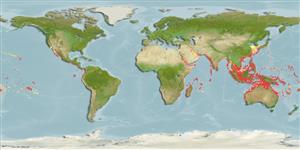Common names from other countries
分类 / Names
俗名 | 同种异名 | Catalog of Fishes(属, 种) | ITIS | CoL | WoRMS | Cloffa
Teleostei >
Carangiformes (Jacks)
鱸形目 (Jacks) >
Carangidae (Jacks and pompanos) > Caranginae
Etymology: Gnathanodon: Greek, gnathos = jaw + Greek, odous = teeth (Ref. 45335).
More on author: Forsskål.
Environment: milieu / climate zone / depth range / distribution range
生态学
海洋 礁区鱼类; 深度上下限 0 - 80 m (Ref. 86942). 熱帶; 35°N - 31°S, 30°E - 77°W
Indo-Pacific: from Kwazulu-Natal, South Africa, north to Mie Prefecture, Japan and east to southwestern coast of Baja California Sur, Mexico and Gulf of California to Ecuador (Ref. 9283).
印度-太平洋。 東太平洋: 墨西哥南下加利福尼亞與加州灣到厄瓜多的西南方海岸.(參考文獻 9283)
Length at first maturity / 大小 / 重量 / 年龄
Maturity: Lm 32.5 range ? - ? cm
Max length : 120 cm TL 雄鱼/尚未辨别雌雄; (Ref. 11441); common length : 75.0 cm FL 雄鱼/尚未辨别雌雄; (Ref. 9283); 最大体重: 15.0 kg (Ref. 30874)
背棘 (总数) : 8; 背的软条 (总数) : 18 - 20; 臀棘: 3; 臀鳍软条: 15 - 17.
稚鱼与年青的成鱼颜色鲜黄色的到银色的; 宽而狭窄的黑色横带交互的; 鳍黄色。 在侧边上成鱼有少数黑色的斑块或斑点; 横带, 如果呈现, 非常模糊的。 唇厚而肉质的。 胸部鳞片覆盖完整。 胸鳍镰刀状的 ; 臀鳍有 2根分离的棘
Adults occur in deep lagoon and seaward reefs where they feed by rooting for crustaceans and fossorial invertebrates in the sand but they also feed on small fishes (Ref. 9710, 90102). Small juveniles live among the tentacles of jellyfish (Ref. 9710). Adults form schools and are also noted for their behavior to closely swim around sharks and other large fishes, and also follow divers (Ref. 10361). Juveniles particularly display this piloting behavior to gain protection from likely predators (Ref. 9710, 90102). Marketed fresh and salted or dried (Ref. 9283). Juveniles are used in the aquarium trade. Minimum depth reported taken from Ref. 128797.
出现于深的泻湖与临海礁石在哪里它们藉着为甲壳动物与其他的无脊椎动物根在砂中觅食。 也吃小鱼。 小的稚鱼生活在水母的触须之中。 (参考文献 9710) 形成鱼群。 它是被记录到让它的行为紧靠在鲨鱼周围游泳与其他的大鱼, 也跟随潜水者 (参考文献 10361) 得到保护避开可能的掠食者.(参考文献 9710) 在市场上销售生鲜地了与盐腌或乾燥的.(参考文献 9283) 稚鱼被用于水族贸易。
Life cycle and mating behavior
Maturities | 繁殖 | Spawnings | Egg(s) | Fecundities | 仔鱼
印度-太平洋。 東太平洋: 墨西哥南下加利福尼亞與加州灣到厄瓜多的西南方海岸.(參考文獻 9283)
Smith-Vaniz, W.F., 1995. Carangidae. Jureles, pámpanos, cojinúas, zapateros, cocineros, casabes, macarelas, chicharros, jorobados, medregales, pez pilota. p. 940-986. In W. Fischer, F. Krupp, W. Schneider, C. Sommer, K.E. Carpenter and V. Niem (eds.) Guia FAO para Identification de Especies para lo Fines de la Pesca. Pacifico Centro-Oriental. 3 Vols. FAO, Rome. (Ref. 9283)
CITES (Ref. 128078)
Not Evaluated
人类利用
渔业: 低经济; 养殖: 商业性; 游钓鱼种: 是的; 水族馆: 商业性
工具
特别资料
下载 XML
网络资源
Estimates based on models
Phylogenetic diversity index (Ref.
82804): PD
50 = 1.0000 [Uniqueness, from 0.5 = low to 2.0 = high].
Bayesian length-weight: a=0.01349 (0.01195 - 0.01522), b=2.96 (2.93 - 2.99), in cm Total Length, based on LWR estimates for this species (Ref.
93245).
营养阶层 (Ref.
69278): 4.0 ±0.52 se; based on food items.
回复力 (Ref.
120179): 中等的, 族群倍增时间最少 1.4 - 4.4年 (K=0.14-0.53).
Prior r = 0.57, 95% CL = 0.37 - 0.85, Based on 1 data-limited stock assessment.
Fishing Vulnerability (Ref.
59153): Moderate vulnerability (43 of 100).
Climate Vulnerability (Ref.
125649): Very high vulnerability (86 of 100).
